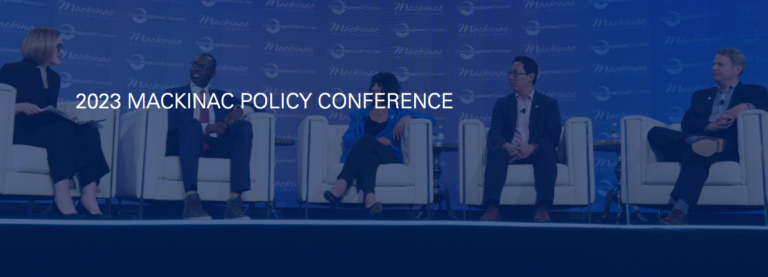
- Kim Kisner
- Events
- 06/06/2023
Detroit Business Leaders Share Diversity & Inclusion Insights at Mackinac Policy Conference

At the beginning of June, 1,500 business, government, and community leaders convened at the Detroit Regional Chamber’s 43rd Mackinac Policy Conference.
SBN Detroit had a presence at the conference, and one of the panels – The Intersection of Business & Equity Objectives – seemed especially fitting for our network, so we’ve recapped it here.
Stephen Henderson, executive advisor, BridgeDetroit, and host of “Detroit Today” on WDET-FM and “American Black Journal” on Detroit Public TV facilitated the discussion with guests: Cynthia Bowman, global head of diversity & inclusion and corporate social responsibility, Bank of America; Ronald Hall Jr., president and CEO, Bridgewater Interiors LLC; Camille Lloyd, director, Gallup Center on Black Voices; and Peter Quigley, president and CEO, Kelly Services Inc.
Key takeaways:
- Bowman: Without discomfort, there is no growth. At Bank of America, diversity and inclusion in the context of the community we serve go hand in hand and we are driven by profit and purpose. And it’s got to be driven from the top. We think we have a role in creating economic opportunity and addressing racial equity within the community and our own people and that means competitive business reviews, talent reviews, performance management, and holding leaders accountable.
- Hall: Bridgewater Materials employs 1,400 people in metro Detroit, and from day one, part of the company mission has been to demonstrate that we could employ an inner-city workforce at the highest level of manufacturing and deliver results. Driving efforts from the leadership team is critical, and having a diverse leadership team is also critical. Companies must lead the way inside the enterprise to demonstrate how it can be done.
- Lloyd: Creating equitable systems in organizations is what workers want and deserve. With the war for talent, we must create an environment where people can leverage opportunities to get ahead and feel like they are doing meaningful work and contributing. People want to work, and we need to create conditions for workers where they can achieve equitable life outcomes.
- Quigley: Obviously, my voice is not Black. People who look like me and have a position like me need to be part of the conversation and be held accountable for the outcome. I implore those of you who are not invested in this conversation to become invested – we all have a stake. At Kelly, we work with thousands of businesses, and those that have embraced the idea that opening up opportunities for more people is good business are achieving the best outcomes. The best-performing companies we serve have adopted a deliberate data-driven approach to DEI that measures and produces outcomes.
- Hall: It’s important to keep employees engaged in decisions that matter to the community. We have our employees help us to decide what outside organizations we donate money to. A lot of employees who live near a plant care about the fact that the company supports community efforts. Leadership should show up at community meetings and respond to concerns. One example is there was an auto theft issue around our Warren plant, so we acted quickly and set up fencing and automatic gates. Employees respond to that. It’s an investment by the company to protect its people and their properties.
- Quigley: Jobs and work are a critical important component of the success of a region, and we need to think about providing opportunities for more people to do so. Drug screening requirements and blemishes on criminal records eliminate 30% of potential employees, and the people who are most impacted by these barriers are people of color. When companies close that funnel, they are preventing more people of color from working there.
- Bowman: There is a lot of debate on how you measure D&I. I say pick a point and measure it. At Bank of America, every manager has an inclusion index and a diversity index. Companies need to define it and measure it and hold people accountable. You need to be true to the data and facts and work toward specifically moving the needle.
- Bowman: We each have a role – corporations, individuals, our own circles of influence. In this moment we each have a voice and responsibility and a cause, and we can do our part to create inclusion for all.
- Quigley: Treating everyone fairly is not enough. We need to be deliberate to radically change the narrative.
Be sure to subscribe to our newsletter for regular updates on sustainable business practices in and around Detroit.
Kim Kisner
- All
- Business
- Community
- Education
- Events

ZF Group, a global technology company with its North American headquarters in Northville, specializes in systems for passenger cars, commercial vehicles, and industrial technology. With a focus on next-generation mobility, the company develops solutions that address electrification, automation, and digitalization while aiming to improve safety, efficiency, and sustainability in transportation. SBN Detroit interviewed Anuj Shah, Sustainability Lead, for the Americas, to explore the most pressing environmental challenges in...

The Chip Bag Project, based in Detroit, is a sustainability initiative that upcycles hard-to-recycle snack packaging — particularly chip bags — into insulated sleeping bags for individuals experiencing homelessness. Founded by Eradajere Oleita, the project addresses both environmental waste and housing insecurity by transforming materials like Mylar into practical, thermally efficient solutions. In June, Oleita was among Trelllis’s 30 Under 30, its annual recognition of the brightest young...

PowerPanel, headquartered in Oxford, focuses on sustainable energy technology with a particular emphasis on hot water systems and thermal energy capture. The company designs and manufactures modular solar hybrid systems that integrate both photovoltaic and thermal components into a single unit. Its goal is to offer energy solutions that are more efficient, durable, and economically viable for a range of commercial and industrial applications. SBN Detroit interviewed Garth...







